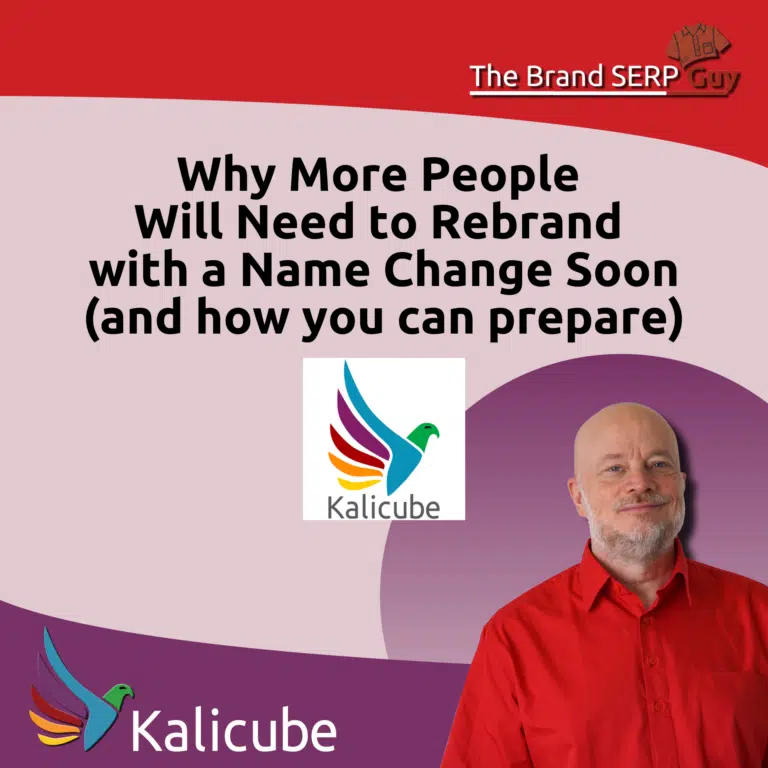Jason Barnard, The Brand SERP Guy at Kalicube, continues discussions on the importance of brand search engine results pages and online reputation management. We’re unable to control everything that is said about our brand online. But, we can proactively put things in place to minimize the damage. Today, Jason shares his tips on proactive online reputation management.
Introduction: Jason Barnard is The Brand SERP Guy at Kalicube and the Author of The Fundamentals of Brand SERPs for Business
[00:00:00] Benjamin Shapiro: Welcome to the Voices of Search podcast. Today, we’re going to discuss the importance of brand search engine results pages and Online Reputation Management. Joining us is Jason Barnard who is The Brand SERP Guy at Kalicube which is a digital marketing agency that is pioneering the concept of brand search optimization and Knowledge Panel management.
[00:00:19] Benjamin Shapiro: Jason’s also the author of the recently launched Fundamentals of Brand SERPs for Business book which is coming hot off the presses. I think it’s the New York Times number one seller, maybe at least in the search category. Yesterday, Jason and I talked about Knowledge Panels for people versus companies.
[00:00:36] Benjamin Shapiro: And today we’re going to continue the conversation talking about Brand SERPs and Online Reputation Management, ORM. And this podcast is sponsored by Deepcrawl. As a Voices of Search podcast listener, you know that SEO and your website health have never been a more important part of your company’s marketing mix.
[00:00:53] Benjamin Shapiro: Maintaining high rankings on Google has a direct impact on revenue and can help you lower your customer acquisition costs, but content and keyword optimisation is only part of the picture. The technical health of your website is a critical ranking factor. Look, we all know that optimising site performance can be an arduous and time-consuming task, but with Deepcrawl’s technical SEO and website health platform, your team will have the analytics and automation solutions you need to track your website’s technical performance, improve page rankings, and stay on the top of search results in Google. So, be smart like the SEO teams at Adobe, eBay, Twitch, PayPal, Microsoft, and Canva who monitor their site performance using Deepcrawl to ensure your site reaches its full revenue potential. Visit deepcrawl.com. That’s deepcrawl.com. The number one platform for technical SEO.
[00:01:46] Benjamin Shapiro: But before we get to today’s interview, I want to tell you about a new show that my company is launching. It’s called The Revenue Generator Podcast. As it turns out, us marketers are under attack. That’s right. The walls between marketing, sales, and customer success teams are all falling down. And unless something changes quickly, your CMO is going to be calling him or herself a CRO in no time. And that’s why we’re creating The Revenue Generator Podcast. The Revenue Generator Podcast tells how innovators of the revenue generation orchestrate teams to deliver world-class customer experiences that integrate data, SAS, people, and processes to expedite demand and increase revenue.
[00:02:28] Benjamin Shapiro: The show is hosted by my good buddy, Doug Bell, who is a 20-year technology veteran that has been instrumental in driving revenue growth and scaling marketing organisations across some of the world’s best known brands and nimble startups. And in each episode of The Rev Gen Pod, you’ll hear how industry leaders integrate sales, marketing product, and customer success into a single business unit with a common goal of optimising their revenue cycle. So, if you’re ready to join me and Doug Bell as a member of the revenue generation, search for revenue generator in your podcast app or head over to revgenpod.com. That’s Revenue Generator in your podcast or head over to revgenpod.com. All right, here’s the second part of my conversation with Jason Barnard, The Brand SERP Guy at Kalicube. Jason, welcome back to the Voices of Search Podcast.
[00:03:19] The Brand SERP Guy (Jason Barnard): Brilliant! It seems like only a few minutes ago. We were already talking.
[00:03:23] Benjamin Shapiro: Don’t tell everybody that we record all of these episodes at once. They’re supposed to think that we show up every morning and everything is recorded live. This is the magic of the internet, isn’t it.?
[00:03:33] The Brand SERP Guy (Jason Barnard): Oh, I’m sorry.
[00:03:34] Benjamin Shapiro: Jason, you’re spilling the beans here.
[00:03:36] The Brand SERP Guy (Jason Barnard): I’m eating my rice crispies and drinking my coffee, and thank you for having me back the second day in a row.
You Can Control and Influence What You Would Like Google to Show Your Audience by Properly Managing Your Website, Your Entity Home, and Your Knowledge Panel
[00:03:41] Benjamin Shapiro: It’s always a pleasure to have you here everyday even if we record all the episodes at once. That said, yesterday, five minutes ago, we finished a conversation talking about Knowledge Panels for people versus companies. So, there’s different strategies if you’re an individual entity with lots of competition, like a person, like your name and a company that has more of a unique name, but has to position itself to be about a specific topic. And often this all sort of feed in the same overall, how do I get Brand SERP placement when somebody searches for my company name, how do I show up? And often the biggest challenge in Brand SERP is making sure what shows up is a) what you want to see but is that the right person or the right entity; and then b) that it’s saying things that are positive about your company.
[00:04:29] Benjamin Shapiro: We used Meta as an example yesterday of company that just went through a knowledge Panel change. They changed their name and so the Knowledge Panel needs to be updated. And when I searched for Meta, all the articles today are how Peter Thiel is leaving the board of Facebook Meta because he wants to help Donald Trump or Donald Trump’s political advocates get elected. So, all the pictures are Mark Zuckerberg, Donald Trump, and Peter Thiel. Probably not what Meta wants to show up on their Brand SERP page. So, talk to me a little bit about Brand SERP, Online Reputation Management, and how do you make sure that there are a bunch of angry white guys on your Brand SERP page all of the time.
[00:05:14] The Brand SERP Guy (Jason Barnard): Brilliant example. Great question. I think they are in a space that most of us will never be in, which is that right at the top of the result, you’ve got the newsfeed. Most of us are not so newsworthy that we will have that newsfeed right at the top, so that isn’t actually something we need to necessarily worry about. So, if we bring it down a few notches away from the big players, like Facebook, Meta, Google, Microsoft and look at what we can manage from a reputation point of view without those news bursts that these big companies get is saying, how can I make sure that I control a maximum of what my audience sees when they Google my brand name, so that if there is any kind of problem with the news, I can actually control it, I can influence what Google shows. Google will be less likely to show that bad news because it’s got such great solid information that it can show about me to my audience. So, we’re looking more at managing Twitter Boxes, managing Video Boxes, managing the YouTube feed, managing social media platforms, managing the blue links, and managing the Knowledge Panel as we talked about yesterday.
ORM Helps Build Your Brand Image, Improves Visibility, Builds Trust and Credibility
[00:06:31] Benjamin Shapiro: So, talk me through what ORM means. It’s Online Reputation Management. You know, when you are looking at your Brand SERP, whether it’s the Knowledge Panel, whether it’s the organic listings and you’re seeing something that you don’t like, I mentioned yesterday, Ben Shapiro, the political podcaster in the United States shows up for my brand term, right? Let’s say I want to get rid of that. I want to rank number one for the term Ben Shapiro, what are some of the ways that I can manage my Online Reputation? Or if somebody say, I guess the bigger issue is if somebody was saying something bad about me or him, and it was getting confused, how do you manage that process?
[00:07:10] The Brand SERP Guy (Jason Barnard): Well, I mean, I think there are two different questions that the question of confusion between yourself and another Ben Shapiro is something we were looking at yesterday. And today, the question is more about what do I do when somebody says something negative about me online and it shows up on my Brand SERP.
[00:07:26] The Brand SERP Guy (Jason Barnard): And the fundamental question to ask yourself is a) why didn’t I have control of that Brand SERP to start with? So, that’s proactive Online Reputation Management. It’s saying I need to make sure that Google understands who I am, what I do, and who my audience is so that it can represent me accurately to my audience when they searched my brand name.
[00:07:48] The Brand SERP Guy (Jason Barnard): And the second part is to say, if it does happen, why does it happen? And in both cases, you’re looking at the idea that Google is showing to your audience when they search your brand name. And remember, when they searched your brand name, they know who you are. They’re either researching you or navigating to your website. So, in those circumstances, Google is trying to show them what it feels is most valuable, helpful, and relevant to them as your audience and they are your audience, but they are simply a subset of Google’s users in this particular context.
[00:08:26] The Brand SERP Guy (Jason Barnard): So, your first question is, say, why is Google showing this negative information?And why it’s showing it is because it thinks it’s valuable and helpful and relevant to your audience. And if that’s not the case, then either Google has misunderstood, or if it’s understood correctly, you have a fundamental business problem.
Leapfrogging is Incredibly Powerful: It’s Simply Saying to Google That You Have a More Valuable Content Underneath a Negative One That It’s Currently Showing
[00:08:46] Benjamin Shapiro: I have a friend who was the CEO of an SEO tool and the company got involved in a lawsuit and when you would Google his name for a short period of time after the lawsuit became public, the first thing that would come up was blank person, CEO of X company in this lawsuit and it was resulting in the company going bankrupt or filing for bankruptcy. Wasn’t exactly something that my friend wanted to highlight as who he was as an independent entity. So, this is a yes, this is news, maybe it’s something that’s the most popular topic, but it didn’t really position him in the way that he wanted to be represented in the eyes of people searching for him and his company. I asked him, “Hey, how’d you bury that? How’d you get rid of all the bankruptcy filings from your brand search term?” And his answer was always, I’m a good SEO. Can you tell me what he did? How did he get all the bankruptcy stuff to be second and third page and highlight all of his social feeds and all of the other content that represented him in a positive light.
[00:09:54] The Brand SERP Guy (Jason Barnard): Right. It’s a great question. And I can tell you the things he probably didn’t do, which is create lots of rubbish content on second rate sites, which is what ORM managers often do, as they say, if we create lots of content around you, we can push that up, we can drown, and the concept of drowning is very popular. I would say, no, you don’t. And I think what he probably did, I don’t know the case, is he leapfrogged and leapfrogging is incredibly powerful. It’s saying I have content underneath this negative content that I feel I can prove to Google is more valuable to my audience. All I need to do is demonstrate to Google that this content is more relevant, helpful, and valuable, and it will push it up onto the Brand SERP because that’s what it puts on the Brand SERP what is relevant, helpful, and valuable to my audience. So, what he probably did is SEO for others, is that he would find an article that he thought represents him positively and he would help that article to rank in the place of the ones that he didn’t want.
All You Need to Do is Convince Google That You Are The Most Authoritative and Honest Reference About Yourself
[00:10:59] Benjamin Shapiro: So, was this as simple as he is going the mechanical turk and having people visit other pages to give Google a signal that this is a popular search result. Having them stay on the page for a certain amount of time as you’re trying to manufacture links to someone else’s page to have those pages managed, fabricate links that are supporting third-party pages. Is it link-building, is it time on site metrics? What’s the way that you get existing content to leapfrog potentially bad reputation content?
[00:11:33] The Brand SERP Guy (Jason Barnard): Well link-building is obviously very helpful. Fake link building, I would argue, will never work. Google isn’t as stupid as it was 15 years ago. But definitely building links to these resources that we feel are valuable is definitely a tactic you can use from the outside. And that’s the point is that there are some aspects of your Brand SERP or some references to yourself that you control: your own website, your company website, your social media profiles. You can obviously influence them. You can do your SEO on them and that’s great. And then, there are third party websites, and that’s the point is that Google will look at these third party references to you. And because they’re third party, it will tend to think this is a great independent reference to you.
[00:12:22] The Brand SERP Guy (Jason Barnard): So, you can contact the person who wrote the article. You can build links to them. You can potentially link out to them from your own site. And that’s an important point. And it’s something that I think a lot of people miss is that I was talking about Andy Crestodina, you are naturally the most authoritative person about yourself. All you need to do is convince Google that you are the most authoritative person about yourself, which sounds ridiculous, but Google doesn’t know that you are. And once you’ve managed to convince it that you are telling the truth, that you are a good representation, an honest representation and authoritative representation of yourself, then you can point to these references and say, I think these are important and Google will actually believe you. So, I wouldn’t underestimate the idea that me, myself, can promote the idea to Google that I am an honest, authoritative reference about myself. It sounds counterintuitive, but it works a treat.
You Need to Proactively Take Control of Your Own Reputation and Your Own Capacity to Communicate to Google the Understanding it Should Have About You as a Named Entity
[00:13:29] Benjamin Shapiro: Google, I know myself better than anybody else does. Can you just trust me about who I am and what I’m trying to rank for because I’d really like for that bankruptcy that my company was involved to not be part of the picture here.
[00:13:43] The Brand SERP Guy (Jason Barnard): Exactly. Well, there are a couple of things there. Number one is I’ve been working on this for nine years, so don’t think it’s going to happen tomorrow. It will happen if you do the work. And the other thing is don’t hook yourself too closely to your company. You are an entity in and of yourself. You have an existence outside of your company and people who have their own company as the principal reference to themselves are basically handing the authority and the management of their own online reputation and their own online presence to that company and the same would be true with Wikipedia. And you have a tendency if you have a Wikipedia page to allow Google to say, well, actually this must be the truth. So, you’ve got to be really careful, in my opinion, as a human being to say I need to take control proactively of my own reputation and my own capacity to communicate to Google the understanding it should have about me as a named entity.
Conclusion: As an Entity, What Google is Looking For is an Entity Home Where You Create Google’s Confidence in Your Authority by Yourself
[00:14:44] Benjamin Shapiro: So, last question I have for you today. Most of the time, when people think about Online Reputation Management, they’re thinking about it after something bad happens. Company went through bankruptcy, all of a sudden my search results aren’t looking great. Let me go fix this. What are the ways that people can be proactive about Online Reputation Management to avoid potentially negative content popping up on their SERPs?
[00:15:07] The Brand SERP Guy (Jason Barnard): Right. Well, you can never beat the machine as it were in the sense that if you’re a newsworthy entity and the news explodes and it’s bad, it’s never going to be possible to actually totally control it. But as an entity, what Google is looking for is an Entity Home. I’m calling it an Entity Home, John Mueller from Google calls it the point of reconciliation. And basically, the machine is looking for a place on the internet. One page that represents the entity controlled by the entity and that’s ironic. Google is looking for the one page that you control. It wants to be sure you control it so that it has a reference. That it can then go out to the rest of the web and compare that reference to.
[00:15:53] The Brand SERP Guy (Jason Barnard): So, if you imagine the rest of the web as this kind of broken plate puzzle of lots of different bits of information, Google wants to compare that to what you’re saying. Obviously you can’t lie. Obviously you can’t outweigh everything that’s being said about you, but if Google is looking to that as the reference, it is your only hope of any level of control or influence on what Google is showing about you when people search. And that whole point, as you say is if you wait until you have a problem, it’s already too late, you need to create that Entity Home and create that Google’s confidence in your authority by yourself, so when the problem does arise, you already have the weapons, you already have the authority to be able to influence Google and help yourself.
Let’s Get In Touch With Jason Barnard (The Brand SERP Guy)!
[00:16:44] Benjamin Shapiro: Rule number one of marketing, always be branding. This also goes for your Brand SERP. Always be working on your brand, establishing the relationship with Google, letting them understand who you are or your organization is what you’re about. Build that footprint. And if something goes wrong, you’ll be able to protect yourself when you have Online Reputation Management issues.
[00:17:07] Benjamin Shapiro: And that wraps up this episode of the Voices of Search podcast. Thanks for listening to my conversation with Jason Barnard, The Brand SERP Guy at Kalicube. If you’d like to get in touch with Jason, you could find a link to his LinkedIn profile on our show notes. You can contact him on Twitter where his handle is Jason M Barnard… that’s J A S O N, the letter M, B A R N A R D. You can visit his website, which is jasonnarnard.com. And if you’re interested in reading Jason’s book, The Fundamentals of Brand SERPs for Businesses, you can go to thebrandserpguy.com and also a special thanks to Deepcrawl for sponsoring this podcast.
[00:17:44] Benjamin Shapiro: It’s time for you to be smart like the SEO teams at Adobe, eBay, Twitch, PayPal, Microsoft, and Canva who use Deepcrawl to monitor their site performance. To ensure that your site reaches its full revenue potential visit deepcrawl.com, that’s deepcrawl.com for the number one platform for technical SEO. And don’t forget to check out our newest show, the Revenue Generator Podcast, which tells how innovators of the revenue generation orchestrate teams that deliver world-class customer experiences through the integration of data, SAS, people, and processes to expedite demand and increase revenue.
[00:18:19] Benjamin Shapiro: So, if you’re ready to join the revenue generation, search for revenue generator in your podcast, app, or head over to revgenpod.com, that’s search for revenue generator in your podcast app or head over to revgenpod.com. Just one more link in our show notes I’d like to tell you about, if you didn’t have a chance to take notes while you were listening to this podcast, head over to voicesofsearch.com where we have summaries of all of our episodes and contact information for our guests.
[00:18:45] Benjamin Shapiro: You can also send us your topic suggestions. You can ask us your SEO questions and you can even apply to be a guest speaker on the Voices of Search podcast. Of course you can always reach out on social media. Our handle is Voices of Search on Twitter, Instagram, Facebook, pretty much everywhere. And my personal handle is Ben J Shap, B E N J S H A P.
[00:19:03] Benjamin Shapiro: And if you haven’t subscribed yet, and you want a daily stream of SEO and content marketing insights in your podcast feed, we’re going to publish an episode everyday during the work week. So, hit the subscribe button in your podcast app, and we’ll be back at your feet in the next business day. All right, that’s it for today. But until next time, remember the answers are always in the data.






